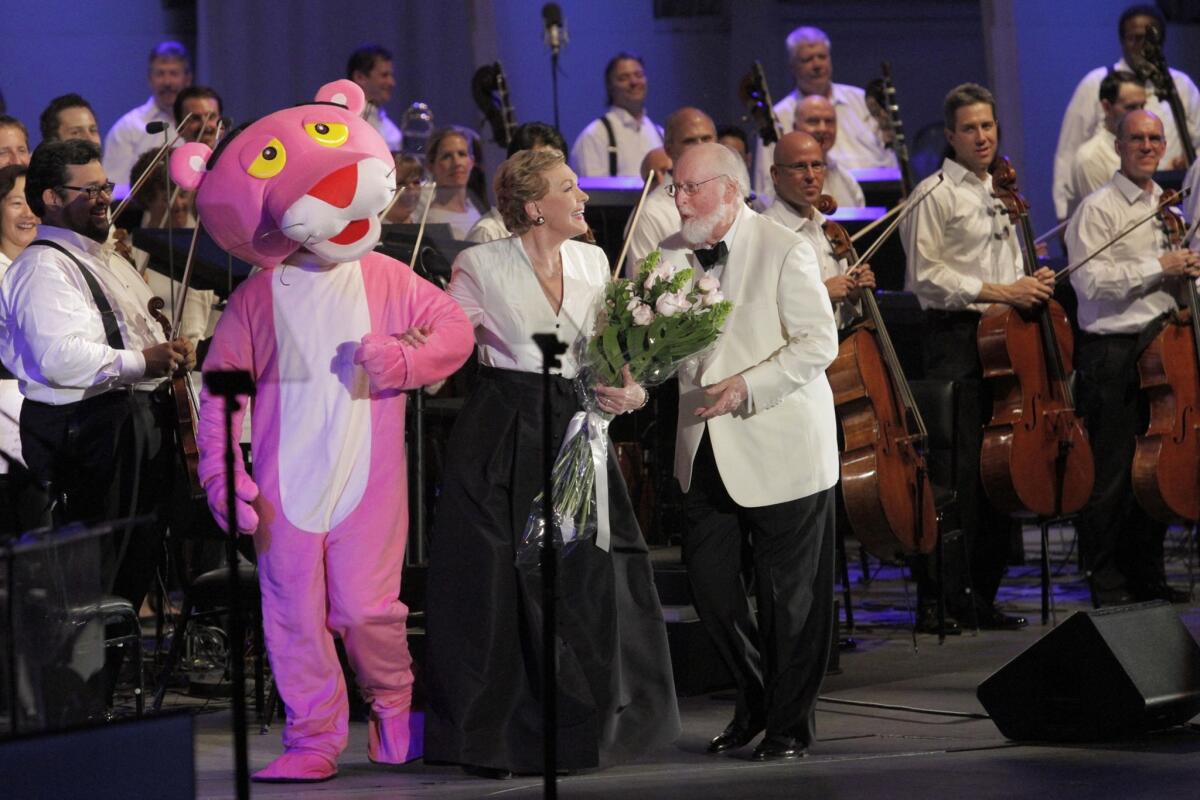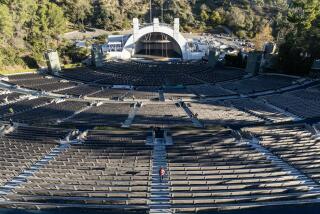Review: John Williams aims for the stars at the Hollywood Bowl

If you listened carefully in the hills and canyons around the Hollywood Bowl on Friday evening, you could almost hear a simple ostinato built around two bass notes that evoked the ominous feeling of an imminent attack by a predatory shark.
Da-dum. Da-dum, da-dum, da-dum. Run for your lives, here it comes!
Something deep, dark and ageless -- at least in pop culture terms -- indeed swept into the Bowl on a very warm summer night. But it wasn’t the Oscar-winning theme from “Jaws” by film composer John Williams, who conducted his annual concert “John Williams: Maestro of the Movies” (the show also plays Saturday night).
PHOTOS: Arts and culture in pictures by The Times
Instead it was the collective beast in the form of a mini-”Star Wars” convention that packed the Bowl from its garden boxes to its grassy hillsides. A touch of Comic-Con descended upon the venerable venue.
After finally hearing the opening strains to “Clash of the Lightsabers” performed by the Los Angeles Philharmonic after intermission, the “Star Wars”-hungry audience lit up the night with hundreds of blue, green and red novelty lightsabers.
You have to hand it to the legions of lightsaber-wielding, “Star Wars” T-shirt wearing sci-fi nerds: The effect looked pretty cool. None could have been more impressed than the lightsaber vendors, who no doubt made off with enough in sales to pay off Han Solo’s debt to Jabba the Hutt.
Even the vaguest of “Star Wars” mentions from the spry 81-year-old conductor were greeted with enthusiastic hoots and shouts. The five-time Oscar winner teased the audience that with director J.J. Abrams now hard at work on another “Star Wars” movie, he might return next year with a new composition for the franchise.
TIMELINE: Summer’s must-see concerts
That tantalizing prospect led to much applause and an official lightsaber salute.
Although Williams has been knocked by some critics for his less-than-subtle movie scores, credit must be given for an act of relative restraint with regard to George Lucas’ beloved movie universe. Naturally much of the night entertainingly mixed sound and image thanks to the wonderful Philharmonic and three gigantic screens displaying great film moments, but almost all of the “Star Wars” pieces were performed without accompanying video clips.
Although depriving the sci-fi crowd of “Star Wars” scenes prevented a true audience frenzy, it was a welcome opportunity to focus on the Philharmonic’s unabashed and splendid performance. (Even without the visuals, Williams and the Philharmonic received several standing ovations.)
But the night was not completely overwhelmed by Imperial storm troopers and fan boys. Mary Poppins and a delightful selection of compositions by Henry Mancini strongly opened the first half of the program.
As a special guest narrator, Julie Andrews -- who also was given a standing ovation -- talked about the great artistic collaboration between her late husband, producer and director Blake Edwards, and Mancini, who worked on some 30 films in 35 years. One of the pair’s first projects together was music for the TV series “Peter Gunn” in 1958, which played well Friday. (John Williams played the piano on the original “Peter Gunn” album.)
With movie clips playing overhead, the performance of “Moon River” from “Breakfast at Tiffany’s” (another Mancini and Edwards project) supplied the night’s most touching moment, just before intermission.
In introducing the piece, Andrews reported that an unnamed executive at a pre-screening of the film demanded “Moon River” be pulled from movie before its release. In addition to Edwards, who directed the film, Audrey Hepburn was at the screening and told the executive it would be done “over her dead body,” said Andrews.
“God bless Audrey,” Andrews added.
ALSO:
‘Aladdin’ to appear on Broadway next year
Nature sinks its roots into Santa Monica’s new parks
Pasadena Pops and Michael Feinstein: a happy arrangement
More to Read
The biggest entertainment stories
Get our big stories about Hollywood, film, television, music, arts, culture and more right in your inbox as soon as they publish.
You may occasionally receive promotional content from the Los Angeles Times.










